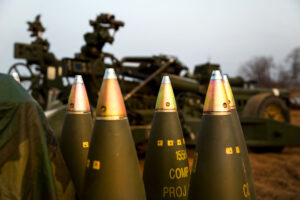Army Secretary Christine Wormuth said Thursday new multi-year procurement authorities will be “helpful” to boosting production of critical munitions, including meeting a goal to manufacture 70,000 155mm artillery shells per month by 2025.
“I think that’s really helpful because one of the things I know I’ve heard from CEOs, ‘If we’re going to ramp production we need to have a constant demand signal to put our money out there,’” Wormuth told reporters at a Defense Writers Group discussion. “It shows them that we will be a customer over time. And it allows them to make investments as a result of that because they know that they can count on the business, if you will.”

The final version of the fiscal year 2023 National Defense Authorization Act included a provision allowing the Pentagon to use multi-year contracts for select critical munitions procurements, to include M1113, M107 and M795 155mm artillery rounds.
As the Army looks to continue providing critical munitions to Ukraine and replenishing its own inventories, officials have cited boosting production capacity as a key near-term priority.
“What we’re really focused on, obviously, is trying to ramp up production of munitions to be able to keep giving as much as we’ve been giving to Ukraine. And we’re doing that through investing in our own organic industrial base,” Wormuth said on Thursday. “And then we’ve been working very, very closely, [Army Acquisition Executive] Doug Bush in particular, with the defense industry folks to try to help them expand their production.”
Bush told reporters in late January “quite a few [deals] are in the works” to make use of the new multi-year authority and added he expects there will be “several big awards” in February and March related to replenishing stockpiles of critical munitions sent to Ukraine (Defense Daily, Jan. 26).
“We’re looking at what we can do with GMLRS [rockets], what we can do with Javelin [anti-tank missiles]. We’re looking at that across the board,” Wormuth told reporters. “I think we’re going to start seeing those multi-year procurements bear fruit.”
On 155mm artillery shells specifically, Wormuth noted the Army has already increased production capacity from 14,000 to 20,000 rounds per month, with the goal to reach a 500 percent increase of 70,000 a month by 2025.
“Obviously, I wish we could do it faster. But there’s sort of a time and physics issue of how quickly you can get the parts and things like that you need to put in the new machining,” Wormuth said of the 2025 target goal.
The Army last week selected General Dynamics Ordnance & Tactical Systems [GD] and American Ordnance to compete for orders to produce 155mm artillery rounds under a new $993.8 million contract, noting the deal will help expand manufacturing capacity of M795 projectiles to produce an additional 12,000 to 20,000 rounds per month (Defense Daily, Feb. 17).
In November, the Army also awarded IMT Defense a $391 million contract to produce 155mm M795 projectile shell bodies and a separate task order to GD OTS to build a new 155mm artillery metal parts production line (Defense Daily, Dec. 8).
Wormuth echoed previous comments from Bill LaPlante, the Pentagon’s top acquisition official, that multi-year procurement contracts, which the Army has used for buying aircraft, is helpful for ensuring supply chain stability in the future.
“[Industry has] to worry about their profit margins. They have to respond to their shareholders. What I’ve heard from CEOs across the board is they understand the importance of what we’re doing as a nation in Ukraine. They want to partner with us and help us both build up the stockpiles for the Ukrainians, for ourselves [through] replenishment. And they’re more able to do that when they know there’s a guaranteed demand for their products,” Wormuth said.
Wormuth said it “remains to be seen” if Congress will extend or broaden multi-year procurement authorities, adding it’ll likely be informed by the results of how current provisions are used to help replenish munitions inventories.
“I would certainly, at this early point, be in favor of seeing multi-year [procurement] authorities be broadened potentially. But I think Congress will want to watch and see what happens,” Wormuth said.